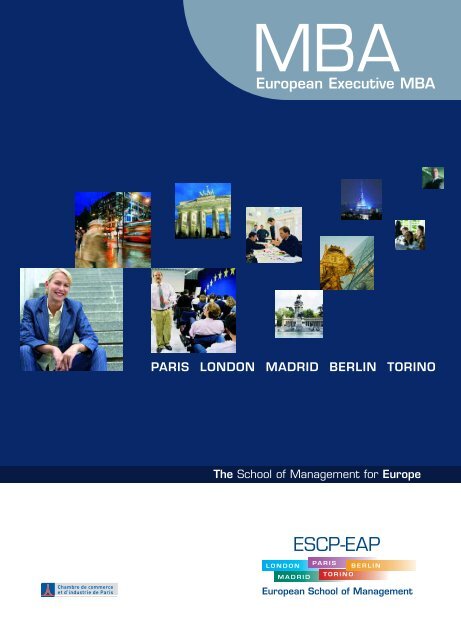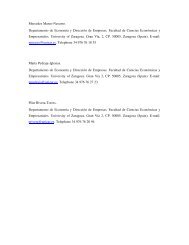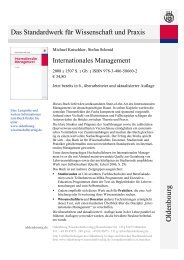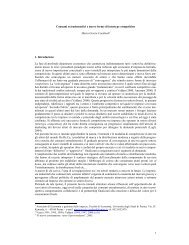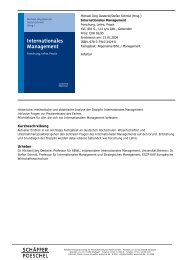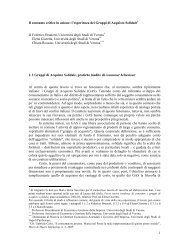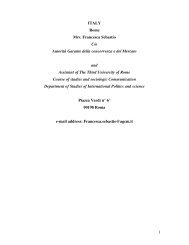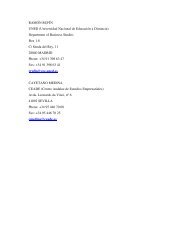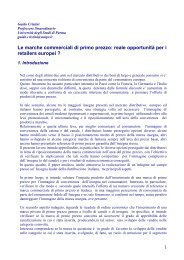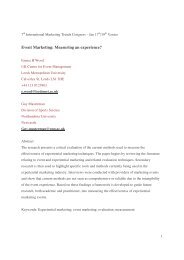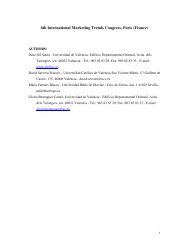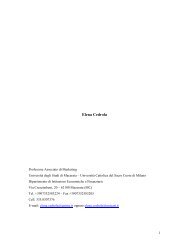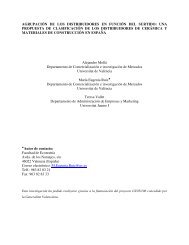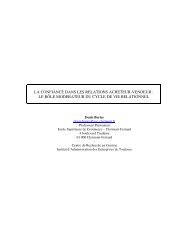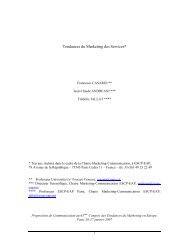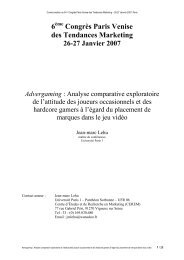European Executive MBA - ESCP Europe
European Executive MBA - ESCP Europe
European Executive MBA - ESCP Europe
You also want an ePaper? Increase the reach of your titles
YUMPU automatically turns print PDFs into web optimized ePapers that Google loves.
<strong>MBA</strong><br />
<strong><strong>Europe</strong>an</strong> <strong>Executive</strong> <strong>MBA</strong><br />
PARIS LONDON MADRID BERLIN TORINO<br />
The School of Management for <strong>Europe</strong>
THE SCHOOL OF MANAGEMENT<br />
FOR EUROPE
Contents<br />
<strong>ESCP</strong>-EAP <strong><strong>Europe</strong>an</strong> <strong>Executive</strong> <strong>MBA</strong><br />
at a Glance 5<br />
Welcome 6<br />
Philosophy 8<br />
Who are our Participants? 9<br />
Curriculum 11<br />
Core Courses 12<br />
Elective Courses 14<br />
Thematic Seminars 16<br />
International<br />
Consulting Project 18<br />
Online Learning 21<br />
Build your <strong>MBA</strong> Curriculum 22<br />
Networking 24<br />
Careers and Alumni Successes 25<br />
Corporate Solutions<br />
and Business Partners 26<br />
Our Privileged Academic Partner -<br />
BI Norwegian School of Management 27<br />
<strong>ESCP</strong>-EAP Faculty 28<br />
Admissions 30<br />
<strong><strong>Europe</strong>an</strong> <strong>Executive</strong> <strong>MBA</strong> Teams 32<br />
<strong>ESCP</strong>-EAP Governance 34
PARIS LONDON MADRID BERLIN TORINO
<strong>ESCP</strong>-EAP <strong><strong>Europe</strong>an</strong> <strong>Executive</strong> <strong>MBA</strong><br />
at a glance<br />
• Campuses in 5 major <strong><strong>Europe</strong>an</strong> cities:<br />
Paris, London, Madrid, Berlin, Torino<br />
• Excellence in management teaching<br />
since 1819<br />
• Real international exposure:<br />
worldwide seminars,<br />
electives on 5 <strong><strong>Europe</strong>an</strong> campuses,<br />
24 nationalities represented<br />
• Post-<strong>MBA</strong> lectures offering <strong>MBA</strong> alumni<br />
the opportunity to improve their<br />
managerial skills throughout their entire<br />
professional life<br />
• A teaching method that draws on<br />
management experience and<br />
fosters maximum interaction<br />
• 125 permanent faculty members<br />
and 50 affiliated professors<br />
3<br />
• External consultants and business<br />
leaders<br />
• Dedicated <strong>MBA</strong> staff<br />
• 30,000 alumni of which 1,700 <strong>MBA</strong><br />
alumni working in over 80 countries<br />
worldwide<br />
• Consistently ranked within the top 10<br />
<strong><strong>Europe</strong>an</strong> Business Schools by the<br />
Financial Times<br />
• The <strong>ESCP</strong>-EAP <strong><strong>Europe</strong>an</strong> <strong>Executive</strong><br />
<strong>MBA</strong> is A<strong>MBA</strong> accredited<br />
• <strong>ESCP</strong>-EAP <strong><strong>Europe</strong>an</strong> School of<br />
Management is AACSB and EQUIS<br />
accredited
4<br />
Welcome<br />
The acceleration of globalisation and the versatility of markets make for<br />
a new geo-economic landscape, far from the traditional boundaries of<br />
international competition of the past decade.<br />
The <strong><strong>Europe</strong>an</strong> economy has always been at the crossroads of major<br />
changes. The main challenge for tomorrow’s <strong><strong>Europe</strong>an</strong> leaders will be to<br />
take stock of such changes and forge ahead. Innovative management and<br />
the ability to anticipate are the keys to success for lasting economic<br />
progress.<br />
Your programme, the <strong><strong>Europe</strong>an</strong> <strong>Executive</strong> <strong>MBA</strong>, has been designed to<br />
train high-level managers to make quick, effective decisions in companies<br />
faced with fierce competition on a worldwide scale.<br />
<strong>ESCP</strong>-EAP takes part in <strong><strong>Europe</strong>an</strong> economic development, spearheaded<br />
by companies and organisations. The knowledge-driven economy and the<br />
desire to innovate will play a major role in building <strong>Europe</strong>’s multi-faceted<br />
social, political and economic future.<br />
In line with the <strong><strong>Europe</strong>an</strong> values of dialogue, open-mindedness, and<br />
respect for all cultures, <strong>ESCP</strong>-EAP, as much at ease with global practices<br />
as local specificities, fosters modern and efficient management education<br />
in Paris, London, Madrid, Berlin and Torino.<br />
Prof. Dr. Pascal Morand<br />
Dean of <strong>ESCP</strong>-EAP
The <strong><strong>Europe</strong>an</strong> <strong>Executive</strong> <strong>MBA</strong> has been designed to train high-level<br />
managers to make quick, effective decisions in companies faced with<br />
fierce competition on a worldwide scale.<br />
Our Programme has three ambitions. The first is to allow managers to<br />
better UNDERSTAND the different dynamics of the modern business<br />
world through the use of the most recent and relevant tools in<br />
management practice. The second is to teach how to manage<br />
uncertainty, in other words to ANTICIPATE by always being one step<br />
ahead of the marketplace. The third is to enable managers to make<br />
wiser DECISIONS about the business as a whole in terms of strategy,<br />
human resources, politics and their stakes in the future.<br />
The <strong>ESCP</strong>-EAP <strong><strong>Europe</strong>an</strong> <strong>Executive</strong> <strong>MBA</strong> programme provides a unique<br />
chance to gain new knowledge and know-how, as well as a new outlook<br />
in a demanding professional and academic environment.<br />
Prof. Dr. Philippe Gabilliet<br />
Dean of the <strong><strong>Europe</strong>an</strong> <strong>Executive</strong> <strong>MBA</strong><br />
Professor of Management & Leadership<br />
5
Philosophy<br />
<strong>ESCP</strong>-EAP's mission is to bring together and to train high-potential<br />
executives for successful careers in a global and multicultural context. It<br />
is our belief that the keys to successful management lie in values such<br />
as open-mindedness, exchange, teamwork and sharing of<br />
experience. Understanding different managerial cultures<br />
and working together to achieve common goals help to create<br />
stronger and more efficient organisations.<br />
Our <strong><strong>Europe</strong>an</strong> <strong>Executive</strong> <strong>MBA</strong> programme builds on two main assets that<br />
characterise <strong>ESCP</strong>-EAP:<br />
Our unique 5-<strong><strong>Europe</strong>an</strong> campus structure provides our<br />
participants with the opportunity to gain real insight into <strong>Europe</strong>’s<br />
socioeconomic, cultural and business environment.<br />
Our action-based teaching method resulting in continuous<br />
interaction between instruction and managerial action, conceptual and<br />
practical approaches, promotes the development of leadership skills of<br />
each of our participants.<br />
Professional organisations are convinced that life-long learning<br />
fosters a more dynamic employee base, more responsive to a rapidly<br />
changing climate. <strong>ESCP</strong>-EAP has been quick to react to this trend<br />
inviting our <strong>MBA</strong> graduates to attend elective courses with current <strong>MBA</strong><br />
participants.<br />
This extension of our elective course portfolio benefits all parties enabling<br />
both graduate and current participants to strengthen their network.<br />
6
Who are our participants?<br />
Statistics . Class of 2009<br />
115 Participants<br />
24 Nationalities<br />
35 Years old (average)<br />
27-44 Age range<br />
18% Women<br />
Education<br />
10% Law and Finance<br />
13% Humanities and Arts<br />
23% Economics and Management<br />
54% Scientific and Engineering<br />
7<br />
Sectors<br />
15% IT<br />
13% Energy<br />
12% Services and Consulting<br />
12% Automotive and Aviation<br />
10% Other<br />
9% Banking, Finance, Insurance<br />
9% Steel & Alum. Industry<br />
7% Telecommunications<br />
5% Pharmaceuticals<br />
4% Consumer Goods<br />
4% Logistics and Transport<br />
"When I started at <strong>ESCP</strong>-EAP I wanted to develop a broader set of management<br />
skills and also to have a truly international professional perspective.<br />
The E<strong>MBA</strong> gave me the amazing experience of working on five campuses<br />
across <strong>Europe</strong> with faculty and participants from a wide range of national<br />
and cultural backgrounds. The hectic schedule of working and studying at<br />
the same time was intense but motivating. I feel now that courses such as<br />
Organisational Behaviour and Marketing have greatly helped me to further<br />
develop my management skills. Through projects and electives I gained the<br />
tools to shift to another position inside the company.<br />
The biggest benefit of my experience at <strong>ESCP</strong>-EAP is the confidence in my<br />
ability to solve business problems. It also gave me an incredible personal<br />
and professional international network.”<br />
Helke Carvalho Hernandes,<br />
<strong><strong>Europe</strong>an</strong> <strong>Executive</strong> <strong>MBA</strong> Class of 2007<br />
Marketing Manager - The <strong><strong>Europe</strong>an</strong> Foundation for Management Development<br />
“Following a diverse professional background of various positions in asset<br />
management, I wanted to develop new perspectives in my career by<br />
moving away from my specialist area of work and develop relationships<br />
with institutional clients. As I definitely wanted to continue working in<br />
finance, the <strong>ESCP</strong>-EAP <strong><strong>Europe</strong>an</strong> <strong>Executive</strong> <strong>MBA</strong> provided me with the<br />
challenge of broadening my skills to areas such as strategy, taxation and<br />
international business law; it also enabled me to brush up on finance too.<br />
The <strong><strong>Europe</strong>an</strong> <strong>Executive</strong> <strong>MBA</strong> has fulfilled all of my expectations in terms<br />
of the variety and quality of courses, has refocused my career objectives<br />
and, more importantly, prompted me to join the world of private banking at<br />
JP Morgan.<br />
In my day-to-day work, the <strong>Executive</strong> <strong>MBA</strong> courses has allowed me to approach<br />
clients from different backgrounds and sectors with greater assurance”.<br />
Julien Jacquet,<br />
<strong><strong>Europe</strong>an</strong> <strong>Executive</strong> <strong>MBA</strong> Class of 2007<br />
Associate at JP Morgan Chase Bank N.A.
Curriculum<br />
The <strong><strong>Europe</strong>an</strong> <strong>Executive</strong> <strong>MBA</strong> curriculum provides participants with<br />
unique opportunities for group learning and study. Study tracks<br />
(Itinerant, Paris, London, Torino and Madrid) which progress<br />
individually on the core curriculum and conferences are brought<br />
together for electives and thematic seminars.<br />
The curriculum is designed on the basis of different delivery and<br />
study modes combining individual work with team projects as well as<br />
interaction among participants and professors. The programme<br />
content is the same for all participants regardless of the track:<br />
• 9 core courses<br />
• 12 electives (a portfolio of 36 courses is offered across the<br />
5 <strong>ESCP</strong>-EAP campuses)<br />
• 5 thematic seminars<br />
• International Consulting Project (in teams)<br />
• On-line e-learning portal<br />
• Access to all conferences held by <strong>ESCP</strong>-EAP<br />
9
Core Courses<br />
Core courses are the foundation of the <strong>MBA</strong> curriculum.<br />
Participants are introduced to the major management disciplines<br />
and exposed to state-of-the-art theory, concepts and real-life<br />
business practices. These courses are taken within each study track<br />
and involve lectures, case studies as well as individual and group<br />
work.<br />
Organisational Behaviour<br />
The human dynamics of the organisation that include its social, cultural<br />
and psychological dimensions will be addressed in this course.<br />
Participants will learn how to decipher and analyze an organisation to<br />
enhance managerial and leadership skills as well as effectiveness.<br />
Organisational structures, individual and managerial behaviours, team<br />
development and other topics will be addressed.<br />
Managerial Economics<br />
Rational decision making involves understanding the macroeconomic<br />
forces that shape the environment in which companies operate and the<br />
microeconomic theories of markets, supply and demand as well as<br />
competition.<br />
This course will provide the keys needed to analyse the competitive<br />
environment and predict market trends.<br />
Corporate Strategy<br />
Thinking strategically, evaluating strategic options, anticipating and<br />
managing strategic change are fundamental skills in today’s everchanging<br />
business environment. The corporate strategy course will<br />
provide participants with tools, models and techniques enabling them<br />
to understand the dynamics of the firm’s situation and how the latter<br />
evolves over time.<br />
Participants will also learn how to perform a strategic diagnosis based<br />
on an analysis of the competitive environment and the evaluation of the<br />
strategic capability of their organisation.<br />
Financial Accounting<br />
Interpreting a financial statement and understanding the implications<br />
of financial decisions will be facilitated through this course which will<br />
introduce key accounting practices, terminology, financial ratios,<br />
cash-flow statements, group financial statements and other notions.<br />
Corporate Finance<br />
This course will explore the two key aspects of corporate finance: investment<br />
decisions and financing corporate organisations. It will introduce<br />
participants to financial concepts and methods that will provide them with<br />
insight into the relationships between financial management and other<br />
aspects of governance, in particular corporate strategy. Present value,<br />
opportunity, cost of capital, valuation of shares, capital structure are just<br />
some of the topics that will be covered.<br />
10
Marketing<br />
The fundamental concepts, terminology and trends of marketing will<br />
be introduced in this course. As the business function that is clearly the<br />
one most directly concerned with the customer, marketing focuses on<br />
understanding, developing and delivering value. Deeply intertwined with all<br />
fields of management, an overview of marketing will be provided during<br />
this course.<br />
Cost Accounting and Management Control<br />
To fully grasp the impact of cost accounting methods and control systems<br />
on decision making, this course will introduce major concepts and performance<br />
management tools that are closely linked to a company’s strategy.<br />
Costs and their determinants, profitability assessment and performance<br />
indicators are the key concepts that will help participants to understand<br />
how actions translate into results.<br />
Operations Management<br />
Competitive advantage can be gained through the implementation of<br />
technological and operational improvements. Tools for effectively<br />
managing efficient operations and managerial attitudes conducive to<br />
productivity gains will be presented in this course.<br />
International Business Law<br />
This course will aim to give participants an overview of the world’s legal<br />
systems with a focus on American and <strong><strong>Europe</strong>an</strong> business law.<br />
International business law and the bodies in charge of enforcing it will also<br />
be discussed as well as the legal aspects of foreign investment, jointventures<br />
and technology transfer.<br />
11
Elective Courses<br />
Electives are 12-hour courses designed to complement core courses.<br />
Each <strong>MBA</strong> participant chooses 12 electives from a portfolio of<br />
36 enabling them to personalize their curriculum and focus on either a<br />
specific management skill or a variety of skills to reinforce and enhance<br />
their knowledge of different management areas.<br />
Elective courses are alternately delivered in Paris, London, Madrid, Berlin<br />
and Torino. Participants from all <strong>Executive</strong> <strong>MBA</strong> classes can choose to<br />
complete the electives of their choice on any of the campuses where they<br />
are offered. This is a great opportunity to mix with participants from all<br />
tracks and also to experience the different management styles and<br />
practices in five different <strong><strong>Europe</strong>an</strong> countries.<br />
12
Leadership and Management<br />
Consulting and Coaching for <strong>Executive</strong>s<br />
Corporate Responsibilities and Ethics<br />
Creating Global Teams<br />
Human Resources for <strong>Executive</strong>s<br />
Idea Management<br />
IT Strategy<br />
Leadership Development<br />
Negotiation: Strategies and Tactics<br />
Unleashing Talent: Using MBTI for Personal and Professional Development<br />
Personal Impact in Communication<br />
Personal Leadership Skills<br />
Strategic Leadership<br />
The Entrepreneurial Toolbox<br />
The Leadership Mystique<br />
Strategy and Marketing<br />
Brand Management<br />
BtoB Marketing<br />
Business and Competitive Intelligence<br />
Corporate Governance<br />
Customer Relationship Management<br />
International Contract Law<br />
International Strategy and Structure<br />
New Trends in Retailing and Consumption<br />
Purchasing for <strong>Executive</strong>s<br />
Services Management<br />
Sustainable Development and Corporate Strategies<br />
Finance and Control<br />
Business Analysis Using Financial Statements<br />
Financial Planning<br />
International Macro Economics<br />
Managing Mergers and Acquisitions<br />
Implementing and Managing Successful Performance Processes<br />
Performance Measurement<br />
Pricing Policies and Performance<br />
Risk Management<br />
Understanding Capital Markets<br />
13
Thematic Seminars<br />
The programme includes five week-long seminars which are each<br />
designed to explore a specific theme related to the business environment<br />
in all its dimensions. These seminars also provide participants with great<br />
opportunities to dialogue with their <strong>MBA</strong> peers as well as share<br />
knowledge and experience.<br />
<strong>ESCP</strong>-EAP believes that actually travelling to the location where the<br />
action and expertise on the subject can be observed first-hand greatly<br />
contributes to participants’ understanding of each seminar theme.<br />
Induction Seminar<br />
During this first seminar, participants gain a deeper understanding<br />
of company structures and processes, develop analytical skills in order<br />
to examine patterns of organisational change and assess today’s key<br />
management issues.<br />
<strong><strong>Europe</strong>an</strong> Business Environment Seminar<br />
This seminar highlights the structure and functioning of <strong><strong>Europe</strong>an</strong> institutions<br />
and their influence on the business environment; macro economical<br />
challenges, competition regulations, lobbying techniques and practices,<br />
EU relations with other regional markets.<br />
Emerging Countries Seminar<br />
In the current context of globalisation, an ability to lead projects in<br />
developing countries is highly valued by companies. Participants have the<br />
choice of travelling either to Asia (India or China) or Latin America<br />
(Brazil).<br />
The main focus of the seminar is to review major issues that firms have<br />
to deal with when developing projects in these regions.<br />
Innovation Management Seminar<br />
The flexibility of North American business culture which fosters innovation<br />
is highlighted in this seminar which enables our participants to<br />
understand the shift from a production to a knowledge-based economy<br />
and the resulting role of innovation.<br />
Closing Seminar<br />
This synopsis seminar is devoted to integrating skills and knowledge<br />
acquired during the <strong>MBA</strong> through case studies and testimonials focused<br />
on strategy implementation and leadership styles.<br />
14
Developing projects in emerging<br />
countries seminar from the inside<br />
The Emerging Countries Seminar in India - an exceptional<br />
moment in the programme - coming back with a wealth of<br />
images and emotions. This was an intellectually challenging<br />
seminar in which the emphasis on culture allowed me to be more<br />
sensitive on how to operate in this specific country.<br />
This seminar went into depth on certain aspects of the Indian<br />
economy such as its potential in a global environment, key issues<br />
of culture and practical case studies to illustrate these topics.<br />
Through the in-company visits I learned a lot about the opportunities<br />
of doing business in India and the possible impact of the<br />
amazing emerging information systems and technology knowhow.<br />
Exchanges between participants and teambuilding were<br />
outstanding during this unforgettable seminar!<br />
15<br />
Marie-Cécile Perchereau,<br />
Lesaffre<br />
<strong><strong>Europe</strong>an</strong> <strong>Executive</strong> <strong>MBA</strong> Class of 2005
International Consulting Project<br />
The International Consulting Project (ICP) is an integral part of the<br />
pedagogical dynamic of the <strong><strong>Europe</strong>an</strong> <strong>Executive</strong> <strong>MBA</strong>.<br />
The ICP is designed to provide participants with a collaborative, multidisciplinary<br />
and often intercultural work experience on a real-life<br />
strategic challenge and to put into practice the concepts and theory<br />
acquired during the <strong>MBA</strong>.<br />
In groups, participants are expected to perform an in-depth analysis of a<br />
situation or an issue faced by a company and to make recommendations<br />
for actions that can realistically be implemented by the firm.<br />
This 8 to 12-month team project will allow participants to use and to<br />
consolidate their understanding of the concepts and tools presented<br />
during the programme:<br />
- either in a business context with which he/she is not familiar,<br />
- or in collaboration with his/her employer.<br />
The ICP results in a series of recommendations that the company<br />
can implement to meet the strategic challenge at hand. The company<br />
sponsor receives a comprehensive written report and the conclusions of<br />
the project are presented to an academic jury.<br />
Examples of ICPs<br />
The ICP’s theme is always based on a strategic issue.<br />
• Reassessment of a corporate strategy in a changing context and<br />
recommendations for implementation<br />
• Analysis of an industry and identification of new business opportunities<br />
• Reorganisation of a subsidiary or a department<br />
• Design and implementation of redundancy plans<br />
• Production of a business plan for a new activity<br />
• Evaluation of consumer trends on a specific product line in light of<br />
market development<br />
• Development of a marketing strategy to enhance brand image<br />
• Setting up or restructuring of a production unit or a distribution<br />
network<br />
16
An international consulting<br />
project from the inside<br />
The Indian automotive industry has recently attracted global<br />
players in all categories of the market. Some of these companies<br />
have started manufacturing cars in joint ventures with Indian<br />
firms. India is no exception to what has been observed in other<br />
countries: relocating operations in different markets eventually<br />
resulted in the move of subcontractors. We wanted to study one<br />
such case and try to understand if the OEM in question needed<br />
to move to India; whether such a move was going to be<br />
profitable; and eventually to find out if there were other options<br />
available to the company.<br />
Our team consisted of four senior consultants: one working<br />
for the company, one working for the auto manufacturer, one<br />
working as a financial consultant and another native from India<br />
working on intercultural issues. The company was able to use this<br />
diversity in coming to a decision about their move to India. Finally,<br />
the decision to go to India outweighed the one to stay out.<br />
The skills developed during our ICP were not just technical<br />
(finance, strategy, marketing) but also entailed a heavy dose of<br />
interdisciplinary management, working with different personalities<br />
and collective decision-making.<br />
Our ICP has left us richer with the experience and more confident<br />
in interpersonal skills.<br />
17<br />
(From left to right)<br />
Antonin Demazy<br />
Chhaya Mathur Saint-Ramon<br />
Simon Karam<br />
Loic Dujardin<br />
<strong><strong>Europe</strong>an</strong> <strong>Executive</strong> <strong>MBA</strong> Class of 2007
PARIS LONDON BERLIN MADRID TORINO
Pre-programme Online Course<br />
We believe that participants will gain the most<br />
from our <strong><strong>Europe</strong>an</strong> <strong>Executive</strong> <strong>MBA</strong> Programme by<br />
refreshing their management knowledge before<br />
the start of our 18-month course. Admitted<br />
candidates have access to 22 online modules in<br />
finance, marketing and strategy.<br />
The online pre-<strong>MBA</strong> programme has been designed<br />
to help participants prepare for the transformations<br />
which they will face when they embark on their<br />
<strong>Executive</strong> <strong>MBA</strong>.<br />
This 18-month adventure will force them to delegate<br />
some of their professional responsibilities. But<br />
which responsibilities should be delegated and how<br />
to delegate successfully? The first modules will give<br />
some pointers as to how to do this.<br />
Online learning<br />
<strong>ESCP</strong>-EAP provides an e-learning portal to all <strong>Executive</strong> <strong>MBA</strong> participants<br />
created with the support of CROSSKNOWLEDGE which is a tool that<br />
gives our participants access to a number of online self-training modules<br />
in all fields of management.<br />
Our objective is to provide participants with a diverse, flexible and evolving<br />
e-learning portal. A series of modules divided into three categories<br />
is currently available: Management Fundamentals, Management<br />
Techniques and Personal Management Skills. They allow participants to<br />
prepare for different courses by reviewing the basics to derive the most<br />
benefit of in-class experience.<br />
The online modules are a good way to guide participants in choosing their<br />
elective courses.<br />
I have really enjoyed using the e-learning modules. They are easy<br />
to access and use and a fun way to review the subject you’ve seen<br />
during a course or in order to prepare for an upcoming class.<br />
There is always a summary of the key points and a little online<br />
evaluation to check that you have really understood what you have<br />
learned.<br />
The online modules are particularly useful in helping you to<br />
consolidate your knowledge!<br />
19<br />
Bruno Belmas<br />
<strong><strong>Europe</strong>an</strong> <strong>Executive</strong> <strong>MBA</strong> Class of 2007<br />
Orange Business Services
Choose Your Core Course Track<br />
Build your <strong>MBA</strong> Curriculum<br />
<strong>ESCP</strong>-EAP has developed 5 different core course tracks in <strong>Europe</strong> to suit our <strong>MBA</strong> participant’s professional and personal<br />
lives. The curriculum is identical for all study tracks though it is not possible to change track after the programme has<br />
started so that group synergy is maintained in each track.<br />
Paris Track:<br />
10 3-day modules spread over<br />
18 months on the Paris campus;<br />
courses in French and English<br />
London Track:<br />
9 3-day modules spread over<br />
18 months on the London campus;<br />
courses in English<br />
Torino Track:<br />
9 3-day modules spread over<br />
18 months on the Torino and London<br />
campuses; courses in English<br />
Madrid Track:<br />
15 3-day modules spread over<br />
18 months on the Madrid campus;<br />
courses in English and Spanish<br />
Itinerant Track:<br />
6 4-day modules spread over<br />
18 months on the 5 <strong><strong>Europe</strong>an</strong><br />
campuses; courses in English<br />
WEDNESDAY<br />
1.30 - 8.00 pm<br />
THURSDAY<br />
10.00 am - 7.00 pm<br />
THURSDAY<br />
10.00 am - 7.00 pm<br />
THURSDAY<br />
7.00 - 10.00 pm<br />
TUESDAY<br />
1.30 - 8.00 pm<br />
THURSDAY<br />
8.30 am - 8.00 pm<br />
FRIDAY<br />
8.30 am - 8.30 pm<br />
FRIDAY<br />
8.30 am - 8.30 pm<br />
FRIDAY<br />
4.00 - 10.00 pm<br />
WEDNESDAY<br />
8.30 am - 8.00 pm<br />
20<br />
FRIDAY<br />
8.30 am - 12.30 pm<br />
SATURDAY<br />
8.30 am - 1.30 pm<br />
SATURDAY<br />
8.30 am - 1.30 pm<br />
THURSDAY<br />
8.30 am - 8.00 pm<br />
FRIDAY<br />
8.30 am - 12.30 pm<br />
Select 12 Elective Courses “à la carte” on all<br />
5 <strong>ESCP</strong>-EAP Campuses…<br />
… in Paris, London, Madrid, Berlin, Torino<br />
Electives are offered jointly to all <strong>ESCP</strong>-EAP <strong>MBA</strong> tracks increasing interaction between participants from all of the<br />
different tracks. This interaction provides participants with the opportunity to build professional and personal relationships<br />
among an <strong>MBA</strong> class of 120.<br />
FRIDAY<br />
1.30 - 8.30 pm<br />
SATURDAY<br />
8.30 am - 1.30 pm<br />
SATURDAY<br />
9.00 am - 2.00 pm
Join 5 Seminars in 18 months<br />
• January: Induction Seminar, Paris<br />
• April: <strong><strong>Europe</strong>an</strong> Business Environment Seminar, Brussels<br />
• October: Emerging Countries Seminar, China, India or Brazil<br />
• March: Innovation Management Seminar, USA<br />
• June: Closing Seminar, <strong>ESCP</strong>-EAP Campus<br />
EXAMPLE OF A SCHEDULE FOR THE INTINERANT TRACK*<br />
Year 1<br />
January<br />
February<br />
1 week – Induction Seminar – Paris Campus<br />
March 1 week – Core Course Module + 2 Electives – Paris Campus<br />
April 1 week – <strong><strong>Europe</strong>an</strong> Business Environment Seminar + 1 Elective - Brussels<br />
May<br />
June 1 week – Core Course Module + 2 Electives – London Campus<br />
July 1 week – Core Course Module + 2 Electives – Madrid Campus<br />
August<br />
September<br />
October 1 week – Emerging Markets Seminar – New Delhi, Rio or Shanghai<br />
November<br />
December<br />
1 week – Core Course Module + 2 Electives – Berlin Campus<br />
Year 2<br />
January<br />
February<br />
March 1 week – Innovation Management Seminar – USA<br />
April 1 week – Core Course Module + 1 Elective – Torino Campus<br />
May<br />
June 2 weeks – Core Course Module + 2 Electives + Closing Seminar –<br />
Paris and Madrid Campus<br />
Total 11 Weeks<br />
* This is an example and could be subject to change.<br />
21
22<br />
Networking<br />
Mixing and Mobility during the Programme<br />
Electives and Thematic Seminars are offered jointly to participants of all<br />
study tracks. This interaction provides participants with the opportunity to build<br />
professional and personal relationships right from the very start of the <strong>MBA</strong> course.<br />
Life-long learning has been developed very successfully as an integral part<br />
of the <strong><strong>Europe</strong>an</strong> <strong>Executive</strong> <strong>MBA</strong>. Our elective course portfolio is now also<br />
open to all <strong>ESCP</strong>-EAP E<strong>MBA</strong> graduates.<br />
<strong>ESCP</strong>-EAP Alumni Association<br />
The school’s Alumni Association make sure that all <strong>ESCP</strong>-EAP graduates can access<br />
information about each other and delegates coordinate alumni events. Our 30,000<br />
graduates are pursuing successful careers around the world.<br />
KEY FACTS & FIGURES<br />
• 30,000 <strong>ESCP</strong>-EAP Alumni<br />
• 1,700 <strong>MBA</strong> Alumni<br />
• 1,000 Master's and <strong>MBA</strong> graduates every year<br />
• 5,000 <strong>ESCP</strong>-EAP Alumni working in over 80 countries around the world<br />
NETWORKING AT <strong>ESCP</strong>-EAP: A VIEW FROM THE INSIDE<br />
The <strong><strong>Europe</strong>an</strong> <strong>Executive</strong> <strong>MBA</strong> is a unique experience, not<br />
only to learn and exchange experiences from each other, but<br />
it is one of the rare moments in your professional life to<br />
extend and strengthen your network extensively in a short<br />
time.<br />
The <strong>MBA</strong> enables us to open-up to very different cultures<br />
and people. Nobody is left out of the network: you will get<br />
used to the fast pace of the courses with the added pleasure<br />
of mixing with a great variety of people (both in terms of<br />
individual experience and country of origin). The programme<br />
(courses, electives, conferences, seminars) sets the pace<br />
and you stick to it….or you are out. So you live, breathe and<br />
share your experience with your <strong>MBA</strong> peers for 18 months.<br />
Now that the <strong>MBA</strong> is over and we are back to a “normal” working pace, we have established a monthly<br />
dinner in a Paris restaurant to maintain the relationships built during the 18-month programme. In addition to<br />
the pleasure of meeting our colleagues again, we share technical expertise (finance, project management…),<br />
we share our contacts (sales opportunities, job opportunities…) and we use the “E<strong>MBA</strong> 2007 Blog”.<br />
One must be aware that the <strong>Executive</strong> <strong>MBA</strong> is not just a network of professionals, friends or students: it is all<br />
three at the same time, which explains the richness of this great experience.<br />
When, in our life, do we have the opportunity and possibility to mix them all in such a short time?<br />
François Monsellier<br />
<strong><strong>Europe</strong>an</strong> <strong>Executive</strong> <strong>MBA</strong> Class of 2007<br />
Ernst & Young
CLASS OF 2007 – INTERNAL COMPANY PROMOTIONS<br />
Careers and Alumni Successes<br />
The <strong><strong>Europe</strong>an</strong> <strong>Executive</strong> <strong>MBA</strong> is proud of the professional successes of so many alumni<br />
as their outstanding achievements clearly result from the <strong><strong>Europe</strong>an</strong> <strong>Executive</strong> <strong>MBA</strong><br />
Programme at <strong>ESCP</strong>-EAP.<br />
<strong>MBA</strong> Participant Previous Position New Position Company<br />
Laurent Elzear R&D Program Manager Head of Business Excellence<br />
23<br />
Nokia Siemens<br />
Networks<br />
Aline Amoros Marketing Manager Country Director France Telecom / Orange<br />
Laurent Boissin Treasurer CFO<br />
ING Real Estate<br />
Investment Mgt<br />
Rafal Szczap Sales Manager for Access Solution Strategic Sales Director, Poland Alcatel Lucent<br />
Iris Bente Frøybu<br />
Head of Market Supply in Nordic<br />
and Baltic<br />
Antony Robert Purchaser in France<br />
Head of Supply and Sourcing Ericsson,<br />
Bangladesh<br />
Head of Asia Pacific Branch<br />
Procurement Office, Beijing<br />
Ericsson<br />
Cyril Chatelet Dealer Development Manager Sales Manager Mazda Automobiles France<br />
Philippe-André Lévêque <strong>Europe</strong> Sales Manager International Marketing Manager Parker<br />
CLASS OF 2007 – NEW COMPANY CAREER PROGRESSIONS<br />
<strong>MBA</strong> Participant Previous Position New Position New Company<br />
Ulrich Steinert Managing Director CFO STRABAG AG<br />
Rabih Chammas Ingénieur Structure Development Manager Oxand<br />
Ali Nouri Program Coordinator<br />
I started the <strong>MBA</strong> programme in January 2006 to boost my career inside John<br />
Crane. I was then export area manager in charge of a few African countries. As<br />
early as August 2006, I was promoted sales manager for 22 African countries and<br />
assigned an exciting target to relocate this business to the Middle East. One year<br />
later, thanks to excellent results and the variety of new skills acquired during the<br />
<strong>ESCP</strong>-EAP <strong><strong>Europe</strong>an</strong> <strong>Executive</strong> <strong>MBA</strong>, I am general manager for that region and<br />
enjoy leading an international team towards future successes.<br />
Deputy Director, Industrial &<br />
Investment Programming<br />
Yves Dubos<br />
<strong><strong>Europe</strong>an</strong> <strong>Executive</strong> <strong>MBA</strong> Class of 2007<br />
General Manager North Africa, John Crane<br />
EDF<br />
AREVA<br />
Victor Garcia Engineering & Quality Director Safety & Regulation Director Faurecia
Corporate Solutions and Business Partners<br />
Your company wants to enhance the performance of your managers<br />
<strong>ESCP</strong>-EAP <strong><strong>Europe</strong>an</strong> School of Management prepares business leaders for the challenges of a changing and<br />
increasingly multicultural world. We believe that first-hand experience of different business environments shape the<br />
attitudes and skills which businesses operating internationally require from their managers.<br />
Solution 1<br />
The <strong>ESCP</strong>-EAP <strong><strong>Europe</strong>an</strong> <strong>Executive</strong> <strong>MBA</strong> enables you to train your employees in all aspects of management whilst<br />
keeping them in their current position by allowing them to study part time on one of our <strong><strong>Europe</strong>an</strong> campuses.<br />
Solution 2<br />
The International Consulting Project is a great opportunity for your company to put forward a high-level project to be<br />
completed by a group of consultants studying our <strong>Executive</strong> <strong>MBA</strong> Programme. Your company can benefit from this<br />
in-depth analysis and strategic recommendations for the development of a specific area of your business.<br />
COMPANY TESTIMONIES<br />
The Energy industry is undergoing important technological<br />
and organisational changes. EDF's international growth<br />
plans require reinforced managerial expertise. We've<br />
chosen <strong>ESCP</strong>-EAP as a partner in order to train our<br />
high-potential executives and to help them achieve their<br />
strategic targets. Through the exchange of managerial<br />
experiences with executives from all over <strong>Europe</strong> and<br />
exposure to different industries, they will develop their<br />
ability to work within multicultural teams and to adapt their<br />
managerial practices to new business environments.<br />
Michel Marchand<br />
Education Director<br />
EDF Corporate University<br />
The ICP established a crucial foundation for the development<br />
of a new category of audit- and consulting services in the<br />
area of corporate compliance, operational risks and<br />
corporate governance. The market analysis provided<br />
by the ICP, the theoretical- and context research, the<br />
strategic analysis and, last but not least, the rollout<br />
planning yielded concrete value and significantly contributed<br />
to the project's success after the rollout.<br />
Hans Jürgen Stephan,<br />
Attorney-at-Law, Managing Director of Control Risks Berlin.<br />
24<br />
Throughout <strong>Europe</strong>, <strong>ESCP</strong>-EAP is well-known<br />
for its faculty’s excellence. For that reason<br />
we want our employees to experience the<br />
methodology taught and to contribute their<br />
newly-acquired knowledge to our working<br />
environment. Moreover, the diversity of<br />
the student body in terms of culture and<br />
profession, will assist our employees to<br />
develop the cross-cultural sensitivity needed<br />
when wanting to progress in a multinational<br />
environment.<br />
Lothar Milde<br />
Personnel Manager,<br />
Toyota Deutschland GmbH
Our Privileged Academic Partner<br />
BI Norwegian School of Management<br />
BI Norwegian School of Management (BI) was established in<br />
1943. The school is an internationally recognised and accredited<br />
private institution. BI has one of <strong>Europe</strong>’s largest and most<br />
productive academic environments in the area of management<br />
and economics.<br />
It is an internationally-oriented business school with an extensive<br />
offering of educational programmes taught in English and<br />
attracting a substantial and increasing number of international<br />
students to the school. The <strong>Executive</strong> <strong>MBA</strong> in cooperation with<br />
<strong>ESCP</strong>-EAP is of great importance to the BI. This joint programme<br />
offers partcipants the benefits from interaction between two<br />
strong academic institutions.<br />
The worldwide network from two well-known and recognised<br />
educational institutions will be a great asset for you in the future.<br />
We welcome you to the <strong><strong>Europe</strong>an</strong> <strong>Executive</strong> <strong>MBA</strong> programme.<br />
25<br />
Dr Pål E Korsvold<br />
Dean of <strong>MBA</strong> Programmes at BI<br />
Professor of Financial Economics<br />
Testimonial – BI <strong>Executive</strong> <strong>MBA</strong> Programme<br />
My reasons for enrolling in BI’s <strong>Executive</strong> <strong>MBA</strong> (E<strong>MBA</strong>)<br />
programme in partnership with <strong>ESCP</strong>-EAP are numerous. I have<br />
for the most part a technical background and I wished to expand<br />
my knowledge base to encompass a wider business perspective,<br />
especially in the areas of strategy, finance and business<br />
management.<br />
The partnership with the <strong>ESCP</strong>-EAP E<strong>MBA</strong> programme provides<br />
an excellent possibility to exchange experiences and knowledge<br />
with others in an international setting.<br />
Erik Rønning<br />
<strong><strong>Europe</strong>an</strong> <strong>Executive</strong> <strong>MBA</strong> Class of 2007<br />
BI Norwegian School of Management
<strong>ESCP</strong>-EAP Faculty<br />
The <strong>ESCP</strong>-EAP faculty has 125 permanent professors and 50 affiliated<br />
professors. Ambitious and innovative, the <strong><strong>Europe</strong>an</strong> <strong>Executive</strong> <strong>MBA</strong><br />
brings together a multidisciplinary teaching team, which includes<br />
international specialists committed to the success of the programme.<br />
Here are the recent publications of some of our faculty.<br />
Professor Olivier Badot<br />
• Commerce et Distribution : Prospective et Stratégies,<br />
Coll. Recherche en Gestion, Economica, Paris, 2005 (with M. Benoun,<br />
Eds.).<br />
• Le Marketeur. Nouveaux fondements du marketing,<br />
2006 (With C. Michon et al.).<br />
Professor Marion Festing<br />
• Strategic Issues and Local Constraints in Transnational Compensation Strategies:<br />
Analysis of Cultural, Institutional and Political Influences,<br />
in: <strong><strong>Europe</strong>an</strong> Management Journal, Vol. 25, No. 2, 2007, pp. 118-131 (with J. Eidems and S. Royer).<br />
• International human resource management.<br />
5th Ed., London et al.: Thomson Learning 2008 (with P. J. Dowling and A. D. Engle).<br />
Professor Frédéric Fréry<br />
Recent Publications<br />
• The Fundamental Dimensions of Strategy,<br />
in: MIT Sloan Management Review, Vol. 48, No. 1, 2006, pp. 71-75.<br />
• Stratégique,<br />
8th Ed., Pearson Education, 2008 (with G. Johnson, K. Scholes and R. Whittington).<br />
Professor Emmanuel Zilberberg<br />
• Le levier prix. Pour concilier rentabilité et croissance,<br />
Editions 'Organisation, 2004, Rom (Prix de l'Académie des Sciences Commerciales 2005).<br />
• Accroître la différenciation tarifaire des spectacles vivants: les leçons du yield<br />
management,<br />
in: La mise à prix de la culture, Tobelem, J.M. (Ed.), L'Harmattan, Paris, 2005, pp. 51-81.<br />
Professor Katharina Balazs<br />
• Leadership et Management des<br />
Hommes”, in Mention: Gestion et<br />
Management,<br />
ed. Guillaume de Lacoste Lareymondie,<br />
Balazs, K., Kets de Vries, M. (Eds.),<br />
Paris: Eyrolles, 2007.<br />
• Some Like it Haute: Leadership<br />
Lessons from France’s Great Chefs,<br />
in: Organizational Dynamics, Vol. 30, No. 2, 2001,<br />
pp. 134-148.<br />
26<br />
Professor Leslie Shaw<br />
• Negotiation and Rhetoric<br />
Proceedings of the Second<br />
International Biennial on Negotiation<br />
(Négocia Paris, Nov. 2005).<br />
• Negotiation, Risk and Russia<br />
(with Nino Mendiburo)<br />
Journal of the Indian Institute of<br />
Management Kozhikode (Kerala,<br />
2008).
Professor Isaac Getz<br />
• La botte secrète : avoir des salariés<br />
impliqués et faisant preuve<br />
d'initiatives.<br />
in: Art de la croissance. Paris, 2007:<br />
Village Mondial/Les Echos.<br />
• Innovate or die: Is that a fact?<br />
in: Creativity and Innovation Management,<br />
Vol.12, 2003, pp. 130-136 (with A. Robinson).<br />
27<br />
Professor Patrick Besson<br />
• Practicing Ambidexterity -<br />
The Dilemmas of a Strategic<br />
Posture in the Making,<br />
APROS 12, New Delhi,<br />
December 9 – 12, 2007.<br />
• Constructing a Strategist<br />
Actor: Strategic Dialogue<br />
and Organizational Transformation,<br />
Paper Presented at the Academy of<br />
Management, Philadelphia, August 2007<br />
(with C. Mahieu).<br />
Professor Christophe Thibierge<br />
• Analyse financière, 2nd Ed., Vuibert, Paris, France, 2007, 160 p.<br />
Translations: Finance, by Bodie and Merton, (translated to “Finance”, 2nd French Ed., Pearson<br />
France, Paris, France, 2007, 570 p.)<br />
• Principles of corporate finance,<br />
by Brealey, Myers and Allen, (translated to “Principes de gestion financière”, 7th Ed., Pearson<br />
France, Paris, France, 2006, 1 050 p.)<br />
Professor Jyoti Gupta<br />
• Debt Entrenchment: Evidence from Thailand and Indonesia,<br />
in: <strong><strong>Europe</strong>an</strong> Journal of Operational research, Vol. 185, No. 3, 2008, Elsevier (with B. Pramuan).<br />
• Mergers and Acquisitions in the <strong><strong>Europe</strong>an</strong> Banking Sector: the case of BNP and<br />
Société Générale, New Trends in Banking Management,<br />
in: World Scientific, Wiley 2002 (with A. Chevalier).<br />
Professor Véronique Tran<br />
• The use, overuse, and misuse<br />
of affect, mood, and emotion in<br />
organizational behavior,<br />
in: N. Ashkanasy, C. Härtel, and<br />
W. J. Zerbe (Eds.): Research on<br />
Emotion in organizations, Vol. 3,<br />
Functionality, Intentionality and<br />
Morality, Oxford, UK 2007: Elsevier-JAI, pp. 31-53.<br />
• Effects of emotion on the process of<br />
organizational learning,<br />
in: M. Dierkes, J. Child, and I. Nonaka (Eds.),<br />
Handbook of Organizational Learning, Oxford University<br />
Press 2001, New York, pp. 369-392 (with K.R.<br />
Scherer).<br />
Professor Stefan Schmid<br />
• Internationales Management,<br />
5th Ed., Munich/Vienna:<br />
Oldenbourg 2006<br />
(with M. Kutschker);<br />
• Strategien der<br />
Internationalisierung,<br />
2nd Ed., Munich/Vienna:<br />
Oldenbourg
Admissions Requirements<br />
Applications will be accepted from holders of a graduate<br />
degree. In certain exceptional cases, the selection<br />
committee will accept candidates who do not have these<br />
qualifications, but who hold a high-level position.<br />
Applicants must demonstrate their managerial skills and<br />
their potential for success within their companies, and<br />
have at least five years of successful professional<br />
experience. They must be highly motivated and<br />
demonstrate their ability and determination to carry out<br />
their educational project along with their professional<br />
and personal life.<br />
The courses and course work are in English. For<br />
non-native English speakers, we require the following<br />
minimum scores on the tests listed below:<br />
TOEFL: 100, TOEIC: 850, IELTS: Band 8 - 9<br />
* Exemptions: over two years working or studying in an<br />
English-speaking country.<br />
These elements will be assessed by the selection<br />
committee, during an individual interview.<br />
Programme Costs<br />
There is an application fee of 150 euros for all<br />
applicants. Tuition for this 18-month programme is<br />
€39,000 net of tax, payable in three instalments in<br />
February, July and January of the following year. A non<br />
refundable €7,500 deposit is required to secure a place<br />
in the programme once admission has been granted. This<br />
deposit is deductible from the first instalment.<br />
These fees include:<br />
• 520 teaching hours.<br />
• All books, materials and online modules for courses.<br />
• Accommodation costs for seminars two, three and<br />
four.<br />
The following costs are not included:<br />
• Travelling costs.<br />
• Accommodation costs for core course modules,<br />
electives and seminars one and five.<br />
Admissions<br />
28<br />
Timetable and<br />
Admission Procedure<br />
Applications are examined in the order<br />
of their arrival; they must be submitted<br />
to the programme office as early as<br />
possible. We accept applications from<br />
February to the 1st of December for<br />
the programme starting the following<br />
January.<br />
Applicants can apply online at<br />
www.escp-eap.eu<br />
Incomplete applications will be put on<br />
hold until all required documents have<br />
been provided. Eligibility is declared<br />
on the proposal of the <strong>MBA</strong> Dean,<br />
after evaluating the information<br />
contained in the application.<br />
Admission interviews take place<br />
from April to December each year.<br />
During an individual interview, the<br />
candidate must convince the selection<br />
committee of his/her abilities and<br />
motivation. Final admission is declared<br />
by a jury presided over by the<br />
Chairman of the <strong>ESCP</strong>-EAP Board.
<strong>MBA</strong> Admissions Offices<br />
<strong>ESCP</strong>-EAP <strong><strong>Europe</strong>an</strong> School of Management<br />
PARIS LONDON MADRID BERLIN TORINO<br />
79, avenue de la République<br />
75011 Paris, France<br />
Tel: + 33 1 49 23 22 70<br />
Fax: + 33 1 49 23 22 90<br />
mba@escp-eap.net<br />
CASABLANCA<br />
Contact :<br />
Zoubida Boutaleb<br />
Tel: + 21 22 50 64 54<br />
Mob.: + 21 265 89 24 77<br />
Fax: + 21 22 50 63 41<br />
z.boutaleb@aobconsulting.co.ma<br />
527 Finchley Road, Hampstead<br />
London NW3 7BG, UK<br />
Phone: + 44 20 7443 8800<br />
Fax: + 44 20 7443 8989<br />
emba_uk@escp-eap.net<br />
Arroyofresno 1<br />
28035 Madrid, Spain<br />
Tel: + 34 91 386 25 11<br />
Fax: + 34 91 373 92 29<br />
solicitudes@escp-eap.net<br />
Heubnerweg 6<br />
14059 Berlin, Germany<br />
Tel: + 49 30 32 00 71 71<br />
Fax: + 49 30 32 00 71 89<br />
mba@escp-eap.de<br />
Corso Stati Uniti 38<br />
10128 Torino, Italy<br />
Tel : + 39 347 78 51 211<br />
Fax: + 39 011 371 69 19<br />
infomba@escp-eap.it
<strong><strong>Europe</strong>an</strong> <strong>Executive</strong> <strong>MBA</strong> Teams<br />
There is a <strong><strong>Europe</strong>an</strong> <strong>Executive</strong> <strong>MBA</strong> Team on each of the <strong>ESCP</strong>-EAP campuses to support candidates and participants<br />
during their <strong>MBA</strong> Programme.<br />
1/Cécile Miranda, 2/Leonilda Renaldo, 3/Vanessa Balounaick,<br />
4/Marianne Conde Salazar, 5/Isabelle Perna, 6/Rachel Maguer,<br />
7/Monique Cruvillier, 8/Maud Teisseire, 9/Marie-Laurence Lemaire<br />
1<br />
2<br />
1/Laetitia Deguil<br />
2/Tore Hellebo<br />
3/Magda Newman<br />
3<br />
30<br />
Paris<br />
1<br />
2<br />
3<br />
London<br />
4<br />
5<br />
6<br />
7<br />
8<br />
9
1<br />
1<br />
2<br />
1/Susanne Tourneau<br />
2/Marion Festing<br />
2/Andreas Braun<br />
2<br />
1/Marco Scognamiglio<br />
2/Silvio Marenco<br />
2/Anna Borsarelli<br />
3<br />
3<br />
Berlin<br />
Madrid<br />
31<br />
1<br />
1/Natalia Andia<br />
2/Annie Medina<br />
2<br />
Torino
<strong>ESCP</strong>-EAP Governance<br />
The Paris Chamber of<br />
Commerce and Industry<br />
A pioneer in management education in France,<br />
the Paris Chamber of Commerce and Industry<br />
(CCIP) owns and operates <strong>ESCP</strong>-EAP <strong><strong>Europe</strong>an</strong><br />
School of Management.<br />
The CCIP is a public institution. The leading CCI<br />
in France and in <strong>Europe</strong>, it represents over<br />
300,000 companies in Paris and the adjoining<br />
“départements” the Hauts de Seine, the<br />
Seine-Saint-Denis and the Val de Marne. This<br />
constituency generates nearly 20% of the<br />
nation’s GDP.<br />
The CCIP offers various services to its member<br />
companies and accompanies them through<br />
all phases of their development. By taking<br />
positions on pending legislation, by helping<br />
companies plan for and prepare the future,<br />
by training tomorrow’s business leaders, by<br />
managing infrastructures, the CCIP plays a<br />
leading role in the national and international<br />
influence of the Capital Region.<br />
The “Land” of Berlin<br />
For over 20 years – since 1985 – the “Land” of<br />
Berlin has provided essential political and financial<br />
support to the CCIP’s educational endeavour in<br />
Berlin. The Senat – the government of Berlin –<br />
has granted <strong>ESCP</strong>-EAP degree accreditation and<br />
made considerable resources available to the<br />
school in Berlin. Today <strong>ESCP</strong>-EAP is an integral<br />
part of the German higher education system and<br />
awards a “Diplom-Kaufmann/-frau”, and a Ph.D.<br />
(Dr. rer. pol.).<br />
The Torino Chamber of<br />
Commerce<br />
The Torino Chamber of Commerce is a founding<br />
partner of the Italian campus and supports the<br />
development of <strong>ESCP</strong>-EAP <strong><strong>Europe</strong>an</strong> School of<br />
Management in Italy.<br />
The University of Torino Faculty<br />
of Economics<br />
Founded in 1404, the University is one of the<br />
oldest in <strong>Europe</strong>. Its Faculty of Economics is<br />
one of the best in Italy. The University of Torino<br />
and its Faculty of Economics have worked in<br />
close partnership with <strong>ESCP</strong>-EAP since 1992.<br />
This led to the successful founding of the Torino<br />
campus in 2004.<br />
<strong><strong>Europe</strong>an</strong> Advisory Council<br />
<strong>ESCP</strong>-EAP takes advice on its strategy and<br />
development from the members of its <strong><strong>Europe</strong>an</strong><br />
Advisory Council. The Council is the <strong><strong>Europe</strong>an</strong><br />
structure integrating the School’s five national<br />
advisory bodies. It includes representatives of<br />
the CCIP and the “Land” of Berlin, as well as<br />
high-level representatives from industry across<br />
the five countries.
WWW.<strong>ESCP</strong>-EAP.EU<br />
WWW.<strong>ESCP</strong>-EAP.EU
<strong>MBA</strong><br />
<strong><strong>Europe</strong>an</strong> <strong>Executive</strong> <strong>MBA</strong><br />
79, avenue de la République<br />
75 543 Paris Cedex 11<br />
France<br />
Phone : + 33 1 49 23 20 00<br />
Fax : + 33 1 43 55 99 63<br />
info.fr@escp-eap.net<br />
527 Finchley Road,<br />
Hampstead<br />
London NW3 7BG<br />
United Kingdom<br />
Phone : + 44 20 7443 8800<br />
Fax : + 44 20 7443 8801<br />
info.uk@escp-eap.net<br />
Heubnerweg 6<br />
14059 Berlin<br />
Deutschland<br />
Phone : + 49 30 32 00 70<br />
Fax : + 49 30 32 00 71 11<br />
info.de@escp-eap.net<br />
www.escp-eap.eu<br />
Arroyofresno 1<br />
28 035 Madrid<br />
Espana<br />
Phone : + 34 91 386 25 11<br />
Fax : + 34 91 373 92 29<br />
info.es@escp-eap.net<br />
Corso Stati Uniti, 38<br />
10128 Torino<br />
Italia<br />
<strong>ESCP</strong>-EAP supports sustainable development - CCIP/ERMES PAO Les Bluets 0645 - Crédits photos : J. Arowas - Joan Debellefontaine - PhotoDisc<br />
Phone : + 39 011 506 92 25<br />
Fax : + 39 011 371 69 19<br />
info@escp-eap.it


